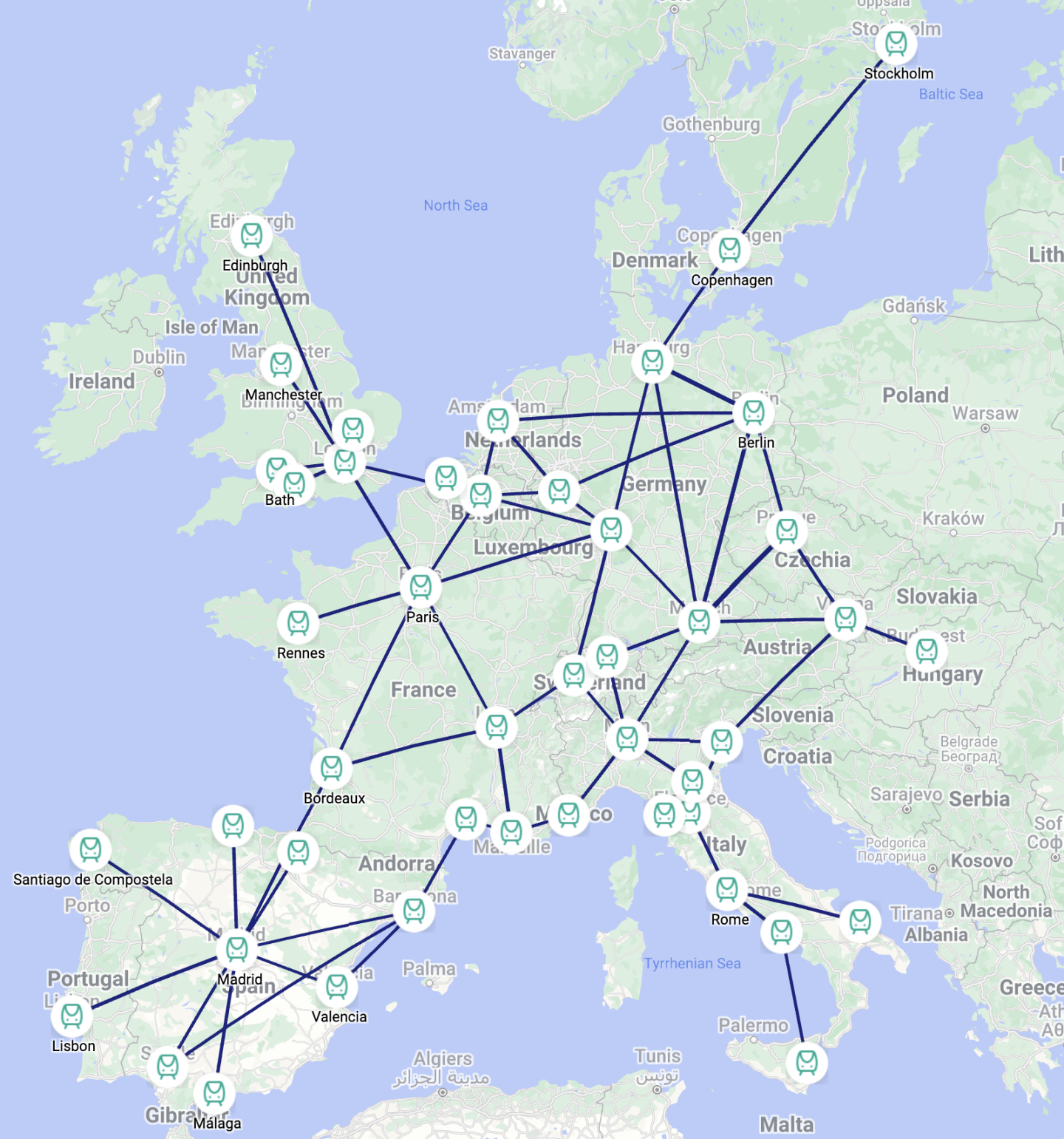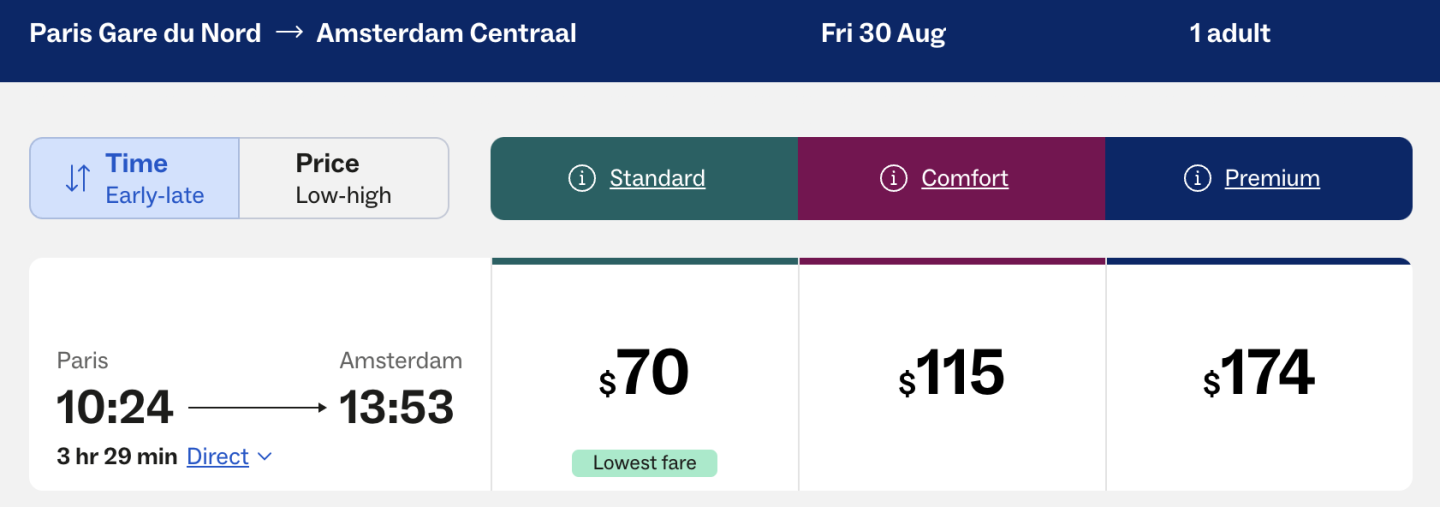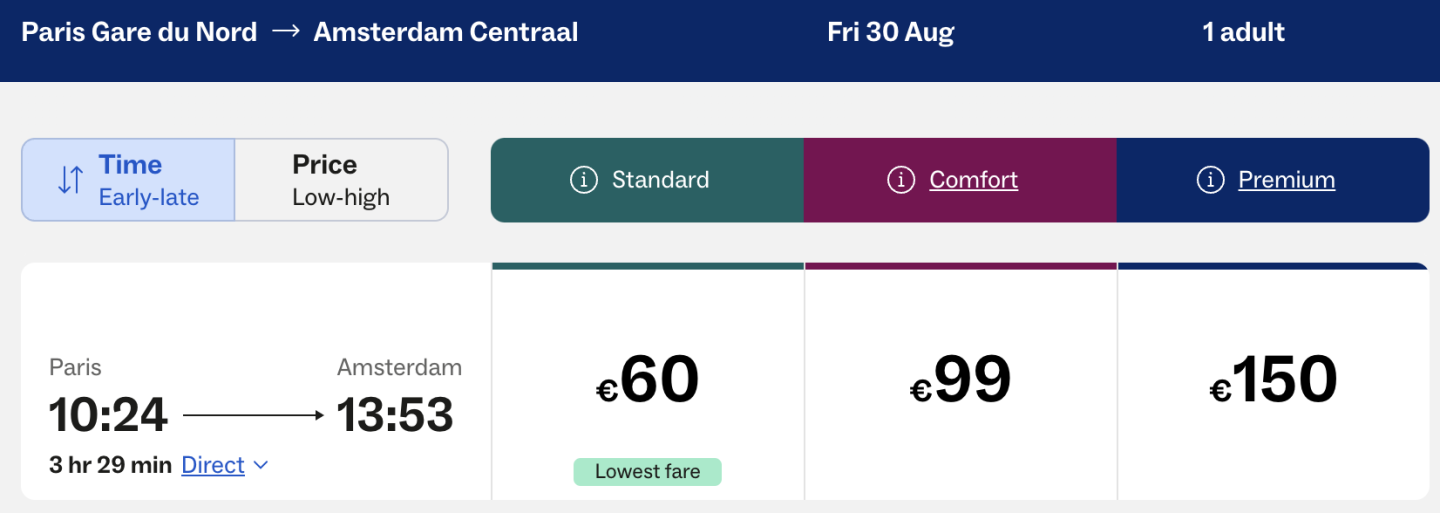Why You Should Consider Train Travel in Europe
You can easily travel through Europe by train because of its well-developed route network.

Many or all of the products on this page are from partners who compensate us when you click to or take an action on their website, but this does not influence our evaluations or ratings. Our opinions are our own.
If you’ve been dreaming about visiting Europe this summer and eating gelato in Italy or visiting the Basílica de la Sagrada Familia in Spain, good news: Airfare is down 8% compared to this time last year, according to Hopper’s 2024 Summer Travel Outlook.
And once you’re in Europe, you may be able to save money if you travel by train. Traveling by train in Europe is convenient and sustainable. Plus, some trains, like the Glacier Express in Switzerland, are designed to travel through scenic destinations so you can sightsee while you relax.
If you’re considering incorporating train travel into your European itinerary, here’s what you need to know about getting around and how to save money on tickets.
Get the 'Cheat Codes' to Cheaper Travel
Unlocking the secret to saving a ton on travel is easier than you think. 📤 Our free newsletter shows you how in 5 min. or less.

Train system in Europe
There are several train companies in Europe. Some only offer regional train service, while others offer trains between countries. As you plan your trip, familiarize yourself with the train companies that serve your intended destination so you can determine if traveling by train makes sense for you.
Here are some train companies that serve different countries in Europe:
- Eurostar trains travel between the U.K., France, Belgium, Netherlands and Germany. (Although the U.K. is not in Europe, it's a popular destination on its own and often coupled with a European itinerary.)
- NS is the leading train company in the Netherlands.
- Renfe is the national train company in Spain.
- Deutsche Bahn (DB) offers long-distance and regional trains in Germany.
- SNCF Connect offers high-speed train travel in France.
- Trenitalia is the state-run train company in Italy.
- Glacier Express offers scenic trains within Switzerland.
Some of these train companies have partnerships with each other to offer convenient connection options. For example, DB-SNCF is a joint venture between DB and SNCF that links travel between Germany and France.
Europe train map
If you Google search “Europe train map,” you’ll find many different maps based on regions, countries, or travel throughout the continent. Here’s a European train map offered by Trainline, which shows different destinations accessible by train.

The interactive map on Trainline’s website highlights popular routes across the country. If the country you’re looking for isn’t featured or you want to see regional trains instead, make your search more specific to check availability.
Booking train travel in Europe
Buying train tickets in Europe is fairly straightforward. You can purchase your tickets through:
- An online travel agency (OTA): Several OTAs that sell train tickets in Europe include Trainline, Rail Europe, Eurail and Omio.
- The train company: If you know which train company serves your destinations, consider booking directly on the train company's website in case you need make any changes, since booking travel through an OTA adds an extra layer of complexity.
- At the train station: If you don’t know (or plan) your schedule in advance, you can purchase a ticket at the train station. Keep in mind purchasing at the train station is running a risk that the train time you want might be sold out, or more expensive, since it’s a last-minute purchase.
3 ways to make your European train fare cheaper
Depending on when and where you buy your tickets, there are a few ways to save money on train travel within Europe.
1. Comparison shop
If the train company and an OTA offer tickets, compare prices to see where those seats are cheaper. We searched for a train from Paris to Amsterdam in August 2024 on the Eurostar site and on Trainline to see which option is cheaper.
Booking directly with Eurostar (price in U.S. dollars and euros)


Booking a Eurostar train on Trainline (price in U.S. dollars and euros)


If you pay in euros, tickets on Eurostar and Trainline are the same price (60 euros). But if you pay in U.S. dollars, the fare is slightly cheaper on Trainline ($68.30 versus $70). If you don’t have a credit card that waives foreign transaction fees, you’d want to book the ticket from Trainline in U.S. dollars.
Generally though, if you’re going to Europe — or really anywhere outside of the U.S. — consider using a credit card that waives foreign transaction fees, because these pesky fees are usually between 1% to 3% and can quickly add up.
2. Take advantage of discounts
There are often discounts available for students, seniors and families.
For example:
- Spanish train operator Renfe, offers up to a 30% discount on tickets for those ages 14 to 25.
- Eurail offers a family discount, a 10% senior discount and up to 25% off for travelers age 27 or below.
- Eurostar offers discounted rates for those under age 26 and 60 and up.
Other discounts or sales may be available, so be sure to shop around. Booking early can also score you a deal. For comparison purposes, we searched for a ticket from Rome to Milan on Trenitalia one week and three months out. Most of the available tickets a week out were priced at $108, while the tickets three months in advance hovered around $48.
3. Consider travel insurance
According to NerdWallet’s annual summer travel survey, an impressive 84% of Americans plan on vacationing in 2024, with 45% of Americans going on a summer trip (June-August). Summer travelers plan to spend $3,594, on average, for their flights and hotel stays.
When considering an expensive vacation, travel insurance can be a good option, particularly if your trip plans are nonrefundable and you want overseas medical coverage. Even if you have a credit card that offers complimentary travel insurance, most U.S.-based medical plans don’t protect you for medical care abroad.
In addition to travel medical coverage, a comprehensive travel insurance plan includes benefits such as trip cancellation, trip interruption, baggage delay and lost luggage coverage. If you don’t need travel medical insurance, and the coverage provided by your travel credit card is sufficient, you may not need to purchase a standalone travel insurance policy.
» Learn more: How to find the best travel insurance
Train travel in Europe recapped
Traveling around Europe by train can be a great way to explore one or several countries, all while avoiding the hassle of the airport or renting a car. There are many options for finding train tickets, but generally, purchasing tickets in advance and directly from the train company can save money.
How to maximize your rewards
You want a travel credit card that prioritizes what’s important to you. Here are some of the best travel credit cards of 2026:
- Flexibility, point transfers and a large bonus: Chase Sapphire Preferred® Card
- No annual fee: Wells Fargo Autograph® Card
- Flat-rate travel rewards: Capital One Venture Rewards Credit Card
- Bonus travel rewards and high-end perks: Chase Sapphire Reserve®
- Luxury perks: American Express Platinum Card®
- Business travelers: Ink Business Preferred® Credit Card
Article sources
NerdWallet writers are subject matter authorities who use primary,
trustworthy sources to inform their work, including peer-reviewed
studies, government websites, academic research and interviews with
industry experts. All content is fact-checked for accuracy, timeliness
and relevance. You can learn more about NerdWallet's high
standards for journalism by reading our
editorial guidelines.
Limited Time Only: Earn $1,000 Toward Travel!
Capital One Venture Rewards Credit Card 
Travel

For a limited time, the
Capital One Venture Rewards Credit Card is offering new cardholders an especially rich bonus: Enjoy $250 to use on Capital One Travel in your first cardholder year, plus earn 75,000 bonus miles once you spend $4,000 on purchases within the first 3 months from account opening - that’s equal to $1,000 in travel!
More like this
Related articles







